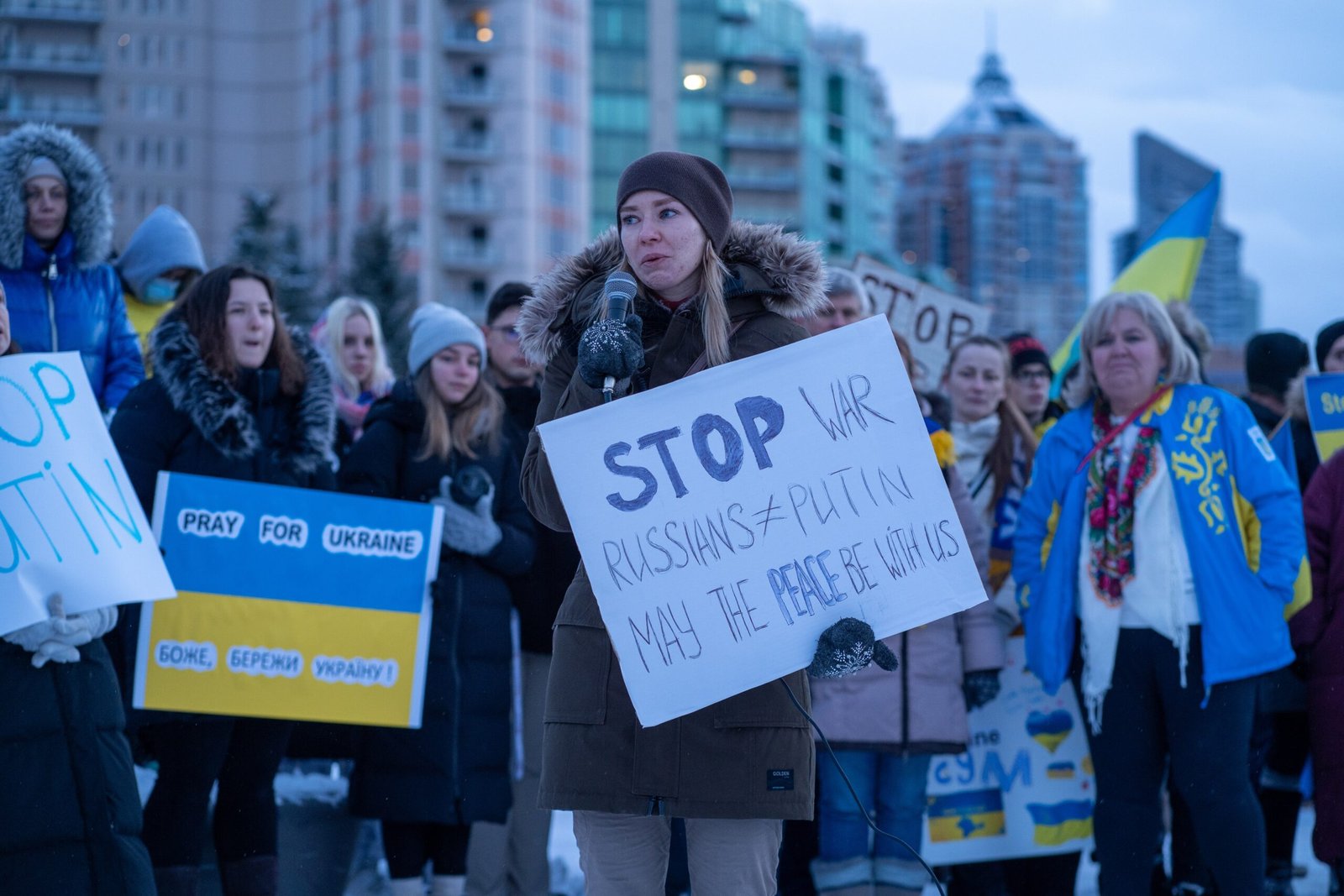
Steven Pinker’s classic 2011 book [1] “The Better Angels of Our Nature” details the violence decline in the world throughout human history. Pinker goes on to explain that since the “New Peace” period – from the end of the cold war up until today – “organized conflicts of all kinds – civil wars, genocides, repression by autocratic governments, and terrorist attacks – have declined throughout the world” [1].
Some believe that this long period of peace and prosperity has come to an end on the 24th of February when Russian forces began the largest land invasion in Europe in the last 70 years.
This 2-part article covers the psychology of war in Ukraine and its effects on leadership, culture, and human behavior.
We will also attempt to answer the pressing question of Who is winning the war? And How—employing human psychology research—can we prevent the next one from happening?
Leadership in times of war
While it is still not clear how either leader will emerge from this conflict (if at all), it is already apparent that an absolute rookie with two years of political experience (+4 years in a presidential TV role) was able to unite a country and its people to fight against a much more experienced, all-powerful, totalitarian leader.
Along with the geopolitical tensions, wants and needs, this conflict symbolizes, in many ways, the struggle between new and old leadership styles.
Literature commonly refers to five types of Leadership styles: Authoritarian, Participative, Delegative, Transactional, and Transformational [see for example 2, 3].
Vladimir Putin’s leadership style is obviously authoritarian. Putin has minimal constraints on his power. Any geopolitical attempt to constrain him is confronted with the threat of using nuclear weapons, as we have all witnessed in the first few days of war. Internally, he is the sole ruler in Russia—an autocratic, all-powerful Czar. His control of the people and media is absolute, with a new Orwellian law imposing up to 15 years imprisonment for sharing government-defined “fake news”. His only prominent opposition leader, Alexi Navalny, was recently poisoned and is now imprisoned, and his continued reign was newly fortified when Valentina Tereshkova, the first female cosmonaut, now a lawmaker in the lower chamber of parliament, put forward a constitutional amendment to secure his presidency until 2036.
While Putin’s authoritarian leadership style allows for a clear and direct one-man-show quick decision-making process [3], this leadership style is notorious for killing all creativity and innovation. Authoritarian leadership centralizes power and decision-making while reducing group input by drastically undermining dissenting opinions, thus lowering the groups’ Collective Intelligence [4].
Prior to the invasion, videos of Putin’s authoritarian style and its effect on his inner circle were published when Sergei Naryshkin—Russian Chief Spy (equivalent to the head of the CIA in the US)— proposed allowing Ukraine a last chance for negotiation. He then immediately had to retract and change his opinion due to Putin’s public grilling [5]. This incident suggests that Putin’s inner circle is so terrified of criticizing him up to the point that they would prefer to “overthrow him before giving him ‘bad news’ about Russian setbacks in Ukraine” [6]. This diminished group intelligence could also be the reason for Russia’s dire miscalculations in Ukraine.
First and foremost, Putin’s inner circle failed to understand the psychological process of how conflicts make nations. War and conflicts demand taking a stand and choosing sides, and since the 2014 annexation of the Crimea peninsula, Ukraine has gradually continued to define its own independence (more on this in my next article).
Ukraine’s willingness to fight in the current crisis as opposed to 2014 surprised the Kremlin, who expected most Ukrainians to flee, passively resign or even greet Russian tanks.
Yet in 2022, despite being dwarfed by the Russian’s massive army, the Ukrainians were able to crush the Russian Blitzkrieg attempts causing the war to extend from days to weeks and potentially months leading to catastrophic death toll and destruction to all, including the unmotivated and ill-equipped Russian forces.
Putin also failed to predict the world’s reaction assuming that the West, which he so skillfully helped weaken during his reign, will not be able to unite, and that NATO – an organization Macron only recently called ‘brain-dead’ [7] – will not be willing to interfere.
Like so many other authoritarian leaders (of nations and companies), Putin could forcefully get his way for so long that he lost sense of his own limitations.
But most of all, he failed to predict the intense historical-psychological reaction to the Ukraine invasion. As hundreds of tanks crossed the Ukrainian borders, the world experienced shock, disbelief and a painful flashback to a not-so-distant past. This traumatic memory caused a psychological transference effect [8], immediately creating a link between Putin and Hitler (Aka ‘Putler’ [9],[10]), and in this historic roleplay, every Western leader was eager to play a Churchill, not a Chamberlin [for comic relief see 11].
Transformational Leadership
While some pundits argue that Zelensky’s lack of political experience cornered Ukraine into its current situation, it is clear that once the Russian invasion began, Zelensky received international admiration and praise for his leadership abilities.
World-renowned researcher Prof Amy Edmondson from Harvard recently wrote:
“I am transfixed by the example of President Zelensky. I have watched every one of his addresses. He is plainspoken, quietly forceful, and unstinting with the truth.
I have been studying leadership and fearlessness my whole life. I’ve never quite seen the likes of this.” [12]
In contrast to Putin’s authoritarian leadership style, Volodymyr Zelensky employs a transformational leadership style [13], whose trademark is exceeding everyone’s expectations.
These leaders create a unifying inspirational vision, never leading by authority or coercion but by personal example. Transformational leaders exhibit a close connection with and trust in their people and allow them a sense of power, freedom, and autonomy, leading to greater achievement, engagement, and wellbeing, making this leadership style one of the most effective and powerful ways to lead.
In their classic book on Transformational Leadership, Bernard Bass and Ronald Riggio wrote: “Transformational Leaders are those who stimulate and inspire followers to both achieve extraordinary outcomes and, in the process, develop their own leadership capacity. Transformational leaders help followers grow and develop into leaders by responding to individual followers’ needs by empowering them and by aligning the objectives and goals of the individual followers, the leader, the group, and the larger organization.” [14]
Transformational leaders typically demonstrate four distinct behaviors, also known as the four I’s [14]:
· Idealized Influence – Transformational leaders serve as role models to be followed, those that truly “walk their talk”.
· Individualized Consideration – They have the ability to have direct contact with the people and their needs, giving them a sense that they are seen.
· Inspirational Motivation – They set high yet achievable goals with a clear and well-articulated vision.
· Intellectual Stimulation – They encourage their people to think for themselves. They promote creativity and innovation and are highly tolerant of their people’s mistakes.
Zelensky’s leadership follows these rules to a tee. Zelensky’s now-famous call for arms, “I need ammunition, not a ride,” was printed on T-shirts and memes across the globe [see for example 15, 16,17]. His bravery in the face of death and his insistence on staying with his family in Kyiv set him up as a true role model for his nation.
Like other transformational leaders, the Ukrainian president has a remarkable ability to lead while making others feel seen. In contrast to the cold and distant manner in which Vladimir Putin leads sitting across his now-iconic huge table, Zelensky is a people’s leader.

[Images: Putin vs. Zelensky – credits – left: Alexei Nikolsky / Associated Press, Right: Reddit]
In a recent interview by Ben Solomon, I was moved by this emphatic leader whose own life and the life of his family currently hangs by a thread. Before commencing the interview, as they switch locations for safety reasons, Zelensky tells the reporter not to sit on the cold marble floor lest it is too cold. He moves back to allow the reporter to sit on the carpet himself, saying: “my grandmother always told me you can’t sit on [the bare marble floor]” [16]. For me, this was a short yet powerful glimpse behind the scenes of a leader who is also a Mensch*.
Zelensky communicates in short videos, and like other transformational leaders, he continually expresses a vision of hope and pride to his people. With his army-style shirt and untamed beard, he sends a unifying message: I am one of the people fighting for our country’s freedom, just like you.
In closing, although the future is unclear, in many ways it seems that Putin’s war efforts have already been immensely successful, not in taking over Ukraine but in making president Volodymyr Zelensky a role model of a brave transformational leader. A leader who made Putin tremble if not fall.
A few final words
Transformational leaders such as Zelensky of both nations and companies move and inspire us. They create a sense of psychological safety; even when they themselves are at risk, they tell us the truth, share future difficulties, and also assure us that we can prevail and succeed. Most of all, they make us all feel that we belong, that we are together and important, and that in working side by side, we can become invincible.
Footnote:
*Mensch – In Yiddish, mentsh roughly means “a good person”. in American English, “mensch” is a particularly good person, similar to a “stand-up guy”, a person with the qualities one would hope for in a friend or trusted colleague. [ https://en.wikipedia.org/wiki/Mensch]
Resources:
[1] Pinker, S. (2011). The better angels of our nature: The decline of violence in history and its causes. Penguin uk.
[2] Bass, B. M., & Avolio, B. J. (1993). Transformational leadership and organizational culture. Public administration quarterly, 112-121.
[3] Huang, X., Xu, E., Chiu, W., Lam, C., & Farh, J. L. (2015). When authoritarian leaders outperform transformational leaders: Firm performance in a harsh economic environment. Academy of Management Discoveries, 1(2), 180-200.
[4] Woolley, A. W., Aggarwal, I., & Malone, T. W. (2015). Collective intelligence and group performance. Current Directions in Psychological Science, 24(6), 420-424.
[5] Putin has tense exchange with his chief spy
[6] They’ll Overthrow Putin Before Giving Him ‘Bad News’
[7] NATO is becoming brain-dead
[8] Transference (Psychological)
[9] “Putler”
[10] Hitler meets Putin caricature
[11] Peter Cook & John Cleese – Peace in our time
[12] Amy Edmondson LinkedIn post
[13] Bass, B. M. (1999). Two decades of research and development in transformational leadership. European journal of work and organizational psychology, 8(1), 9-32
[14] Bass, B. M., & Riggio, R. E. (2006). Transformational leadership. Psychology press.
[15] Zelensky vs. Putin memes, T-shirt with quote , and another example (not affiliated to me JJ)







